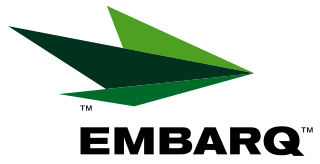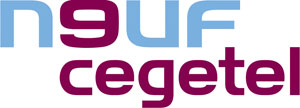This article contains content that is written like an advertisement .(February 2011) |

Vivodi was a private telecom operator in Greece that offered telephone rates for OTE subscribers.
This article contains content that is written like an advertisement .(February 2011) |

Vivodi was a private telecom operator in Greece that offered telephone rates for OTE subscribers.
Vivodi was acquired by On Telecoms, a telecommunications business backed by UK-based Argo Capital Management, in 2009. [1]
Vivodi's main service was internet services, and ADSL was its main product for private customers.
Vivodi offered ADSL lines by utilizing local loop unbundling, which allowed private companies to have full or shared access to the local loop of the customer. Through this, it offered ADSL lines with data rates up to 4 Mbit/s and ADSL2+ lines with data rates up to 20 Mbit/s in some districts of the Athens Metropolitan Area, as well as in Thessaloniki.

Integrated Services Digital Network (ISDN) is a set of communication standards for simultaneous digital transmission of voice, video, data, and other network services over the digitalised circuits of the public switched telephone network. Work on the standard began in 1980 at Bell Labs and was formally standardized in 1988 in the CCITT "Red Book". By the time the standard was released, newer networking systems with much greater speeds were available, and ISDN saw relatively little uptake in the wider market. One estimate suggests ISDN use peaked at a worldwide total of 25 million subscribers at a time when 1.3 billion analog lines were in use. ISDN has largely been replaced with digital subscriber line (DSL) systems of much higher performance.
The following is an outline of communications technology in Morocco.
Telecommunications in Uruguay includes radio, television, telephones, and the Internet.
Digital subscriber line is a family of technologies that are used to transmit digital data over telephone lines. In telecommunications marketing, the term DSL is widely understood to mean asymmetric digital subscriber line (ADSL), the most commonly installed DSL technology, for Internet access.
Very high-speed digital subscriber line (VDSL) and very high-speed digital subscriber line 2 (VDSL2) are digital subscriber line (DSL) technologies providing data transmission faster than the earlier standards of asymmetric digital subscriber line (ADSL) G.992.1, G.992.3 (ADSL2) and G.992.5 (ADSL2+).

A digital subscriber line access multiplexer is a network device, often located in telephone exchanges, that connects multiple customer digital subscriber line (DSL) interfaces to a high-speed digital communications channel using multiplexing techniques. Its cable internet (DOCSIS) counterpart is the cable modem termination system.
A leased line is a private telecommunications circuit between two or more locations provided according to a commercial contract. It is sometimes also known as a private circuit, and as a data line in the UK. Typically, leased lines are used by businesses to connect geographically distant offices.
Telkom SA SOC Limited is a South African wireline and wireless telecommunications provider, operating in more than 38 countries across the African continent. Telkom is majority state-owned (55.3%) with the South African government owning 40.5% of Telkom, while another 14.8% is owned by another state-owned company - the Public Investment Corporation (PIC), which is closely linked to the South African government.
KCOM Group is a UK communications and IT services provider. Its headquarters are in the city of Kingston upon Hull, and it serves local residents and businesses with Internet and telephony services. It was listed on the London Stock Exchange but is now privately owned by Macquarie Group.

TelstraClear Limited was New Zealand's second-largest telecommunications company before being acquired by Vodafone New Zealand in October 2012, previous to which it was a subsidiary of Australian company Telstra.

Embarq Corporation was the largest independent local exchange carrier in the United States, serving customers in 18 states and providing local, long-distance, high-speed data and wireless services to residential and business customers. It had been formerly the local telephone division (LTD) of Sprint Nextel until 2006, when it was spun off as an independent company. Embarq produced more than $6 billion in revenues annually, and had approximately 18,000 employees. It was based in Overland Park, Kansas.

Free S.A.S. is a French telecommunications company, subsidiary of Iliad S.A. that provides voice, video, data, and Internet telecommunications to consumers in France. Its head office is in the 8th arrondissement of Paris and it is the second-largest ISP in France.
Telecommunications in Montenegro includes radio, television, fixed and mobile telephones, and the Internet.
High-bit-rate digital subscriber line (HDSL) is a telecommunications protocol standardized in 1994. It was the first digital subscriber line (DSL) technology to use a higher frequency spectrum over copper, twisted pair cables. HDSL was developed to transport DS1 services at 1.544 Mbit/s and 2.048 Mbit/s over telephone local loops without a need for repeaters. Successor technology to HDSL includes HDSL2 and HDSL4, proprietary SDSL, and G.SHDSL.
Whidbey Telecom is a private, independent telecommunications company operating on the South End of Whidbey Island in Washington State, the community of Point Roberts, Washington, and its affiliate Hat Island Telephone Company on Hat (Gedney) Island. Whidbey Telecom has been locally owned and operated since it started business in 1908.

Neuf Cegetel was a French wireline telecommunications service provider and a mobile virtual network operator (MVNO). It offered various telecommunications services to consumers, enterprises and wholesale customers, ranking second in the country in annual revenues. It was legally established in 2005 following the completion of the merger between Neuf Telecom and Cegetel. As of June 2008, the company became a wholly owned subsidiary of SFR, and the brand disappeared commercially.
Internet access is widely available in New Zealand, with 94% of New Zealanders having access to the internet as of January 2021. It first became accessible to university students in the country in 1989. As of June 2018, there are 1,867,000 broadband connections, of which 1,524,000 are residential and 361,000 are business or government.

Internet in the Czech Republic and Internet access are largely provided by the private sector and is available in a variety of forms, using a variety of technologies, at a wide range of speeds and costs. In 2013, 68% of Czechs were connected to the Internet.From 2013 to 2022, the number of Internet users in the Czech Republic increased rapidly to 91.48%.

Thailand's connection to the Internet began in 1987 via the Australian Research and Edcuation Network using UUCP and SUNIII which transformed to full TCP/IP in 1992 to UUNET. This marked Thailand as an early participant in bringing the Internet to Asia.

Connexus is an Australian-owned and operated business telecommunications provider founded in 1989 and based in Sydney, Australia, which primarily caters to the business sector. Connexus specialises in business-grade phone, mobile and NBN.